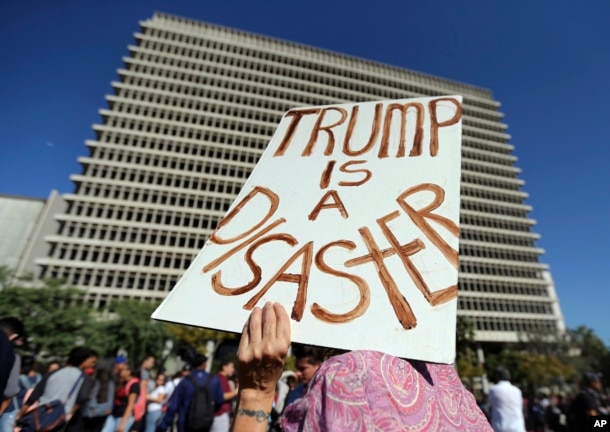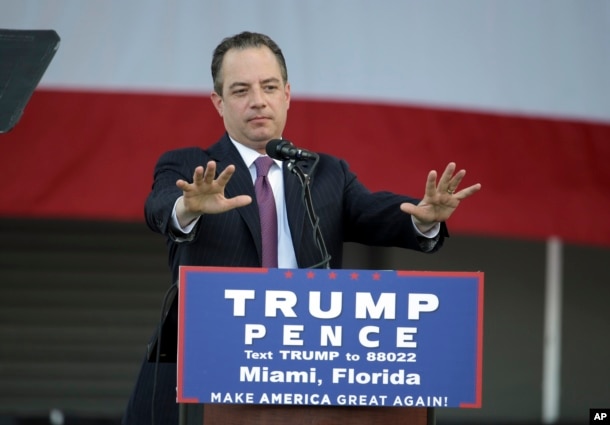Trump’s Challenge: Deliver on Election Promises While Uniting the US

Jim Malone
VOA NEWS
WASHINGTON — In a little more than two months, Donald Trump will be inaugurated as the 45th president of the United States. One of Trump’s key challenges will be balancing the demands from his supporters that he deliver on his numerous campaign promises, while at the same time taking steps to heal the nation in the wake of the divisive and, at times, nasty presidential campaign.
Trump is now immersed in forming a new government, ticking off the various boxes of putting together a Cabinet and making thousands of appointments to the senior ranks of the federal government.
Following his victory in the early morning hours of November 9, Trump did sound a note of conciliation in his first remarks as president-elect. «I say it is time for us to come together as one united people.»
Delivering the goods
One of Trump’s first objectives is to push economic measures through Congress that address what his supporters call «the forgotten man and woman» — working-class Americans trying to deal with the effects of globalization. White working-class voters turned out for Trump in big numbers in key states like Pennsylvania, Ohio, Michigan and Wisconsin, most of which have voted Democratic in recent years.
Those voters will be expecting change, said Daniel Hamilton, executive director for the Center for Transatlantic Relations at the Johns Hopkins School of Advanced International Studies in Washington.
«You see still lingering effects of the great recession, the financial crisis in the United States where the numbers show the United States growth is back, but it hasn’t affected lots of people. And those people have basically staged a revolution to upend the system,» Hamilton said.
Ongoing unrest
In the days that followed Trump’s election, protests in many cities around the country have marred the euphoria experienced by many Trump supporters. Protesters have turned out in cities across the country, from New York and Massachusetts in the east to Oregon and California in the west.
Trump has said the protests were partly the work of professional organizers; but many of the demonstrators say they are driven by fear and worries about what Trump will do as president on immigration and refugee issues, among others.
A protest leader in Massachusetts said their concerns go beyond the usual feelings of loss after a bitter election campaign.
«I get disappointed, but this one scares me,» she said as protesters marched behind her.
There also have been post-election incidents of intimidation targeting minorities and Muslims, and Trump was asked about that in a «60 Minutes» interview on CBS television.
«I am so saddened to hear that, and I say stop it, if it helps,» he said.

Students from several high schools rally after walking out of classes to protest the election of Donald Trump as president in downtown Los Angeles Monday, November. 14, 2016.
Balancing competing goals
The dual desire to heed the election results and try to bind the wounds of a divisive election campaign was also on President Barack Obama’s mind when he met with reporters at the White House on Monday before heading to Greece.
«It’s really important to try to send some signals of unity and to reach out to minority groups or women or others that were concerned about the tenor of the campaign,» he said.
The political unrest comes as Trump begins to name his incoming government, including Republican Party chair Reince Priebus as his chief of staff and highly controversial journalist Stephen Bannon as his top political adviser. Bannon was an executive with Breitbart News, a site favored by right-wing ultra-nationalists that has drawn fire from organizations tracking hate groups, including the Southern Poverty Law Center, which said Trump should withdraw the appointment.

Reince Priebus, chairman of the Republican National Committee, speaks at a campaign rally for Donald Trump in Miami, November 2, 2016. Priebus will serve as Trump’s chief of staff.
The transition challenge
Trump’s first major test in the weeks ahead is staffing the government, and his status as a political outsider looking to «drain the swamp» of Washington insiders and establishment figures makes that a special challenge.
«The process of staffing a government is a big one in America, and as an outsider candidate, he does not have the traditional connections, the traditional people that an administration would have,» said John Fortier, with the Bipartisan Policy Center in Washington.
Trump’s ability to both deliver on his campaign promises and encourage a process of national healing could depend on how much he is willing to moderate his rhetoric, which often became a flashpoint during the campaign.
«We have the sense of Trump that we’ve seen on the campaign trail, and then we have a slightly more muted version of Trump that we have seen come out from time to time,» said Molly Reynolds, a fellow in Governance Studies at the Brookings Institution. «And the question of whether that latter form, that pivot that we often anticipated, but never quite saw during the presidential campaign, will that come out when he gets to the White House? We just don’t know.»
Trump is expected to announce members of his Cabinet in the weeks ahead, and those appointments will send a message about the tone and direction of the incoming administration and where it wants to take the country.

